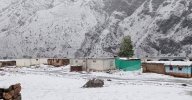How to install the app on iOS
Follow along with the video below to see how to install our site as a web app on your home screen.
Note: This feature may not be available in some browsers.
You are using an out of date browser. It may not display this or other websites correctly.
You should upgrade or use an alternative browser.
You should upgrade or use an alternative browser.
KP Tourism
- Thread starter ghazi52
- Start date
ghazi52
PDF THINK TANK: ANALYST

- Joined
- Mar 21, 2007
- Messages
- 103,040
- Reaction score
- 106
- Country
- Location
.,.,
07 / 05 / 2023
For more information inbox call or whatsapp
0092331 5431321
Or Insta Dw_Tours
FB
 Dream World Tours and travels
Dream World Tours and travels
— in Nathia Gali.

07 / 05 / 2023
For more information inbox call or whatsapp
0092331 5431321
Or Insta Dw_Tours
FB

— in Nathia Gali.

ghazi52
PDF THINK TANK: ANALYST

- Joined
- Mar 21, 2007
- Messages
- 103,040
- Reaction score
- 106
- Country
- Location
,.,..,
Flood warnings affect tourism badly in Swat, say traders
Local traders and hoteliers say middle and working classes would suffer owing to the economic policies of the government.ghazi52
PDF THINK TANK: ANALYST

- Joined
- Mar 21, 2007
- Messages
- 103,040
- Reaction score
- 106
- Country
- Location
,.,.,.,.
Lake Saif-ul-Muluk, situated approximately 9 miles north of Naran in the Kaghan Valley, KPK, stands as a captivating natural wonder and a prominent tourist destination. Beyond its visual appeal, the lake is steeped in a local folklore, familiar to the region's residents but lesser-known to the wider audience.
This tale, featured in the renowned collection "1001 Arabian Nights" available in Bengali, Balochi, Farsi, Punjabi, and English, narrates the story of Prince Saif-ul-Muluk, an Egyptian noble. Prince Saif, enamored by a dream featuring a lake and a fairy named Badri Jamala, confided in his father about his desire to meet this enchanting figure.
Despite his father's counsel that their union was improbable due to their differing natures, Prince Saif embarked on a journey to find the fairy. After years of wandering, he sought guidance from a saint in Naran. Instructed to pray atop a mountain hill for 40 days, Prince Saif gained control over two Jinns.
They bestowed upon him a 'Sulemani Cap,' rendering him invisible to humans and enabling interaction with the supernatural. Empowered, the prince approached the lake where Badri Jamala resided. The narrative unfolds with the introduction of Deo-Safed, the furious guardian of the fairy, who pursued the couple.
The pursuit concluded tragically at a location now known as "Deosai." Legend further suggests that the Ansu lake in Kaghan Valley was formed from the tears of Deo-Safed, grieving the loss of his fairy.




Lake Saif-ul-Muluk, situated approximately 9 miles north of Naran in the Kaghan Valley, KPK, stands as a captivating natural wonder and a prominent tourist destination. Beyond its visual appeal, the lake is steeped in a local folklore, familiar to the region's residents but lesser-known to the wider audience.
This tale, featured in the renowned collection "1001 Arabian Nights" available in Bengali, Balochi, Farsi, Punjabi, and English, narrates the story of Prince Saif-ul-Muluk, an Egyptian noble. Prince Saif, enamored by a dream featuring a lake and a fairy named Badri Jamala, confided in his father about his desire to meet this enchanting figure.
Despite his father's counsel that their union was improbable due to their differing natures, Prince Saif embarked on a journey to find the fairy. After years of wandering, he sought guidance from a saint in Naran. Instructed to pray atop a mountain hill for 40 days, Prince Saif gained control over two Jinns.
They bestowed upon him a 'Sulemani Cap,' rendering him invisible to humans and enabling interaction with the supernatural. Empowered, the prince approached the lake where Badri Jamala resided. The narrative unfolds with the introduction of Deo-Safed, the furious guardian of the fairy, who pursued the couple.
The pursuit concluded tragically at a location now known as "Deosai." Legend further suggests that the Ansu lake in Kaghan Valley was formed from the tears of Deo-Safed, grieving the loss of his fairy.




HaiderAfan
FULL MEMBER

- Joined
- Aug 7, 2024
- Messages
- 815
- Reaction score
- 0
- Country
- Location
لواری ٹاپ، جسے لواری پاس بھی کہا جاتا ہے، ایک خوبصورت پہاڑی درہ ہے جو پاکستان کے صوبہ خیبر پختونخواہ کے ضلع چترال میں واقع ہے۔

HamzaWaseem
FULL MEMBER

- Joined
- Aug 7, 2024
- Messages
- 259
- Reaction score
- 0
- Country
- Location
سبحان اللہ،
نگر چاہے گلگت بلتستان میں ہو یا چترال میں، نگر قدرتی خوبصورتی کا ایک شائکار ہے۔ لوئر چترال کے گاوں نگر میں ایک نئے فورٹ کی تعمیر بھی کی گئی ہے۔ یہ گاوں اپنی انوکھی خوبصورتی کے ساتھ پہاڑوں کی سربلندی، خزاں کے موسم کی دلکشی، درختوں کی چھاؤں، دریا کے بہتے پانی اور آسمان کی وسعتیں اللہ پاک کی عظمت کا منہ بولتا ثبوت ہے۔
نگر چاہے گلگت بلتستان میں ہو یا چترال میں، نگر قدرتی خوبصورتی کا ایک شائکار ہے۔ لوئر چترال کے گاوں نگر میں ایک نئے فورٹ کی تعمیر بھی کی گئی ہے۔ یہ گاوں اپنی انوکھی خوبصورتی کے ساتھ پہاڑوں کی سربلندی، خزاں کے موسم کی دلکشی، درختوں کی چھاؤں، دریا کے بہتے پانی اور آسمان کی وسعتیں اللہ پاک کی عظمت کا منہ بولتا ثبوت ہے۔
Similar threads
- Replies
- 0
- Views
- 835
- Replies
- 1
- Views
- 1K
- Replies
- 1
- Views
- 2K






